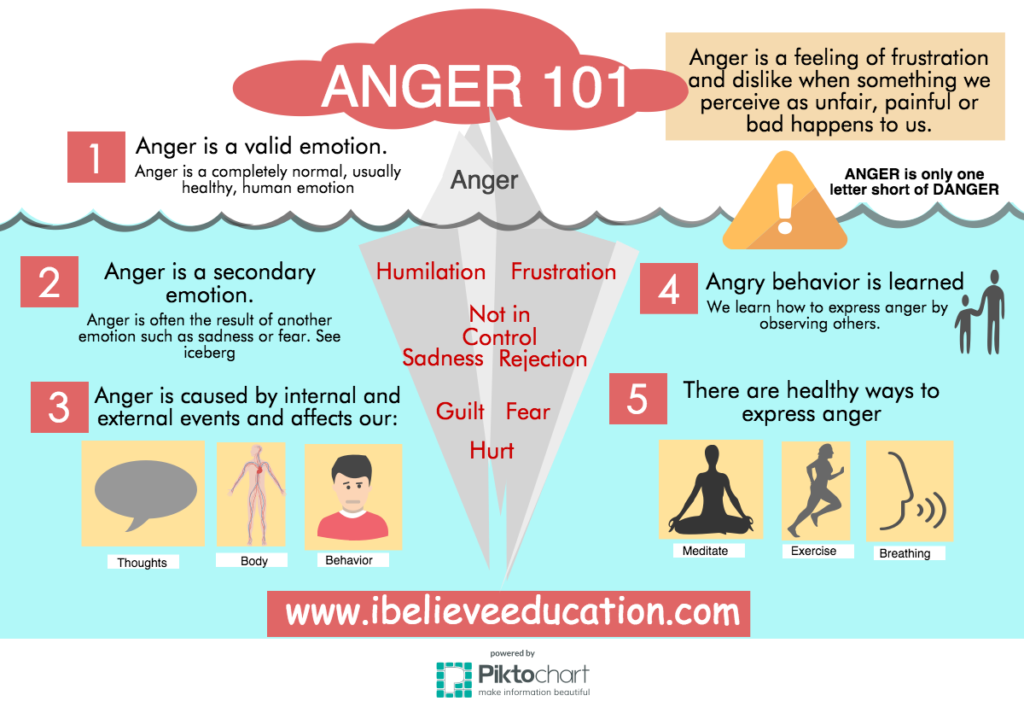Like all things we learn how to deal with anger when we are children growing up in our families. We see how our parents and others in the family deal with things and we copy them. We do this unconsciously and it is often called “learnt behaviour.” If nobody talks about how they feel then we don’t learn a feelings vocabulary and when we get older we find it very hard to express ourselves because we do not have the words.
Everybody gets angry at some point in their life and especially children when they are learning what is right and wrong. When your Mum or Dad say “No” to something you want; when we are learning to share! We don’t always get our way and we express this – do you remember any ‘temper tantrums’ you had! If our parents never showed anger or frustration then we will bottle up any angry feelings we have because we will think that it is wrong to get angry. Or if our parents flew off the handle and started shouting and screaming when they were angry then we learn that this is the way to react. Have a think back, how did your family show anger?
There is nothing wrong with anger as I said in my earlier blog (Some Facts About Anger) https://counsellinginblackpool.com/anger-the-facts/

In this video Dr. Larry Iverson talks about the 6 Steps we go through before we get to anger. It is very good at explaining
how frustration can led to anger if we let it. It only last about 8 minutes. https://www.youtube.com/watch?v=6UP6WV801Qg .
Often with anger there is more to it than meets the eye. There are times when you get frustrated/angry because someone annoys you e.g. pushes in in front of you at the queue in the shop or when you try to speak to someone on the phone about something and you are passed from one department to another (and half an hour later you end up back at the first person you spoke to!). These are really just everyday frustrations but sometimes anger is hiding something deeper that we are feeling.
These can be underlying feelings and issues. We show anger but really we are feeling a much deeper hurt or pain that stems from deep within us and we may not realise what they are hiding. However, we find ourselves getting angry more than we should or at the slightest little thing. Sometimes we have to look behind the anger and see what is really going on. We may discover it is sadness, be guilt. It is like an iceberg (not the lettuce), we only see the anger not what is underlying. Looking at the picture do any of the feelings stand out for you?

Activity – if you are not sure why not try this. When you have calmed down after an outburst think about what was happening just before you got angry. Was someone talking to you? What did they say? How did they say it (tone of voice)? If it was something on TV, what was it that you were watching? Was it something you saw? Monitor yourself for a week.2 weeks and see if you can identify what was happening just before you lashed out/screamed at someone. This will help you to identify your “triggers” or know when someone is “pushing your buttons”
Once we recognise where our anger is coming from e.g. when my partner talks to me in that tone of voice it reminds me of my mother telling me off and making me feel useless, I could never do right by her…. Or when I see such and such on TV it upsets me and it reminds me of when I was locked under the stairs every evening as child. There are all sorts of reasons. In these situations we feel threatened. I said in my earlier blog (https://counsellinginblackpool.com/anger-the-facts/) that these threats could be real, e.g. someone is following you down the street at night or they can be perceived.
A percieved threat is when you think you are in danger but there is no actual physical danger present. We feel threatened in another way – in our thoughts. Our bodies remember how we felt useless when we were being told off by our mother and the same feelings are aruosed in us when our partner talks to us and this sparks off the anger. Catching just what that thought is is the difficult part of trying to work out where our anger is coming from.
Once you have discovered what is at the source of your anger then you can start to move forward. You can begin to have control over it rather than it controlling you. People have said to me “I don’t know what’s causing my anger, I just get in a rage and I can’t control it.” I belive that we can control it. If you can get to the bottom of what is causing it then you can start to take that control back.
I will sum this blog up with this picture which explains what I have been saying in my last two blogs really well.



Leave A Comment